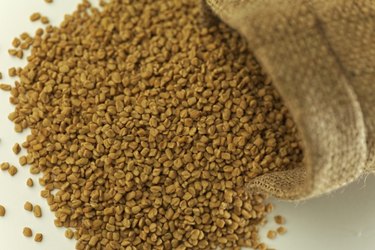
Fenugreek is both a spice and a medicinal supplement commonly used in regions of the Middle East, Egypt and India. As a supplement, fenugreek has been used historically to treat stomach problems, bronchitis, arthritis and constipation. Fenugreek may also improve breast milk production in lactating women. In addition, this herb may also aid in blood sugar and cholesterol regulation. However, more clinical research is needed to examine the purported health benefits of fenugreek.
Warning
Video of the Day
The amount of fenugreek you should take each day depends on a number of factors, including your weight, age and health status. Only your doctor can tell you how much fenugreek is appropriate for you. For this reason, consult your doctor for personalized fenugreek dosage recommendations before taking this herbal supplement.
Video of the Day
Dosage
The recommended daily dose of fenugreek is 5 to 30 g defatted fenugreek seed powder up to three times daily, according to health professionals with the University of Pittsburgh Medical Center. If you're taking fenugreek to help lower high triglyceride levels, your daily dosage may be closer to 25 to 50 g defatted seed powder each day. Usually, fenugreek is best taken before or during mealtime. Alternatively, you can take fenugreek as a tincture in a 3 to 4 mL dose three times each day.
Side Effects
After taking a dose of fenugreek, you may experience mild to moderate side effects. Stomach irritation is common and may result in bloating, gas or frequent diarrhea. You may also notice that your urine or sweat gives off an odor that smells similar to maple syrup.
Precautions
Fenugreek may cause a severe and potentially life-threatening allergic reaction in people who are allergic to green peas, peanuts, chickpeas or soybeans. If you're allergic to fenugreek, exposure to this herb may cause vomiting, weakness, dizziness, hives, flushing, facial swelling, difficulty swallowing, wheezing, shortness of breath or fainting. A mild allergy to fenugreek may also induce nasal congestion or coughing. Contact an emergency medical provider immediately if you exhibit signs of an allergic reaction after handling or ingesting fenugreek. In addition, fenugreek may lower blood sugar levels and should be used with caution by people with diabetes. As a person with diabetes, it's important to check your blood sugar carefully -- especially if you're using fenugreek -- to ensure it doesn't fall to severely low, or hypoglycemic, levels. Hypoglycemia may cause dizziness, blurred vision, hunger, fatigue, sweating or headache. If such side effects arise, contact your medical provider for further care.